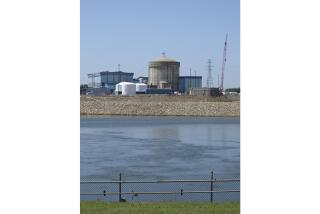Chemical Arms Incinerator Said Rife With Defects
- Share via
WASHINGTON — A controversial Army incinerator used to destroy chemical weapons in Tooele, Utah, is riddled with safety defects and is operated by managers who are not qualified to recognize the risks, according to a former top executive of the plant.
Managers of the incinerator--operated by the Massachusetts-based contractor EG&G; Inc.--routinely disregard safety problems and are focused only on meeting ambitious Army schedules for the destruction of poison gas, wrote Gary Millar, the plant’s former general manager, in a 10-page letter.
The letter, sent to EG&G; President Fred Parks on Nov. 9, has touched off an investigation by Utah state authorities responsible for granting EG&G; a permit to operate the plant. How Utah officials and others obtained the letter is unclear.
EG&G; officials could not be reached for comment late Tuesday. In the past, the firm has insisted that the plant is safe and that no possibility exists for poison gas to escape the perimeter of the plant.
Any troubles at the Tooele facility could complicate the Army’s larger effort to destroy its stockpile of chemical weapons. The Army is planning to build similar incinerators at seven other sites, which house 31,000 tons of mustard and nerve agents left over from as far back as World War I.
Army officials had no comment late Tuesday about the allegations by Millar, who says he was fired by EG&G; in October after raising safety concerns. The former safety manager at the plant, Steve Jones, was fired last year after, he says, he began raising safety concerns.
Last month, the Army issued a press release saying in general terms that it was beginning a safety investigation at the plant. The press release made no mention of the letter, however.
The Utah Department of Environmental Quality, which issued an operating permit to the facility, raised its own concerns about Millar’s allegations in a letter sent to the Army on Monday.
Dennis R. Downs, director of the Utah department, said his agency was looking into the accuracy of Millar’s allegations about the “potential effects on safety and environmentally compliant operations at the facility.” Even before the letter surfaced, environmental groups alleged the plant was a safety hazard to the surrounding community and to nearby Salt Lake City. The Army won a lawsuit, brought by a coalition of environmental groups, that sought to block the start-up of the Tooele plant last summer and since then has trumpeted its success in destroying about 62,000 pounds of GB nerve agent.
Within days of starting up operations in late August, the Army was forced to shut down the plant after nerve agent was detected in areas of the plant’s ventilation system that were supposed to be free of poison gas.
The Army later said it determined that a seal on a ventilation purification chamber needed to be improved, but that no nerve agent had escaped into the environment.
Millar said the plant’s operation is falling far short of the destruction rates that were anticipated, in part because munitions are jamming equipment.
More to Read
Sign up for Essential California
The most important California stories and recommendations in your inbox every morning.
You may occasionally receive promotional content from the Los Angeles Times.














